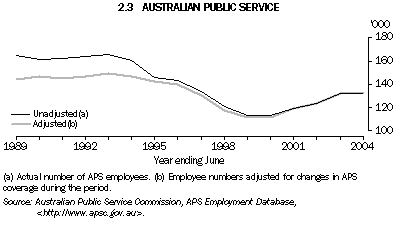THE AUSTRALIAN PUBLIC SERVICE
The Australian Public Service (APS) provides policy advice to the Australian Government and facilitates the delivery of programs to the Australian community. It is part of the broader public sector, which includes parliamentary departments and employees, Australian-owned companies, statutory authorities, a separate public service for each of the states and territories, and local government employees. There are currently 18 government departments and around 60 statutory agencies in the APS. An updated list of these bodies is available at <http://www.apsc.gov.au/apsprofile/agencies.htm>.
Each government department is managed by a Chief Executive Officer, or Departmental Secretary, who is responsible to the relevant minister for the efficient, effective and ethical use of resources. The minister, in turn, takes political responsibility for the actions of the department. As well as answering to the relevant minister, the APS is accountable to the Australian community through a variety of mechanisms including parliamentary committees, administrative law, the Ombudsman and the Auditor-General. Statutory agencies are responsible for a specific function prescribed within departments’ portfolio responsibilities. For example, the Australian National Audit Office falls within the Department of Prime Minister and Cabinet and provides a range of audit services to the Parliament and Australian Government public sector agencies.
Departments and statutory agencies are governed by legislation specific to their functions, and by the Financial Management and Accountability Act 1997. This Act details specific requirements for the management of human and financial resources. The 18 departments and a majority of statutory agencies are also subject to the Public Service Act 1999 (PSA).
As at June 2004, there were 131,522 APS employees working under the PSA (graph 2.3). Of this number, there were 122,102 ongoing employees and 9,420 were non-ongoing. All APS employees have a responsibility to comply with all applicable Australian laws and are held accountable for their work practices under various Acts relevant to their employer, such as: the Commonwealth Authorities and Companies Act 1997, the Workplace Relations Act 1996, the Criminal Code Act 1995 and the Crimes Act 1914.
In addition, APS employees are subject to the APS Values and Codes of Conduct. These guidelines require public servants to act responsively, accountably, impartially and with integrity when working with the Government and Parliament, other APS employees and the public. The guidelines are available at <http://www.apsc.gov.au/values/conductguidelines.htm>.
In the new millennium, the public sector has undergone a regeneration to harness public resources which will give practical effect to government policies. This process used to be known as ‘public administration’ but is increasingly referred to as ‘public management’; reflecting the APS expectation that public sector managers take responsibility for achieving results in an efficient, timely and ethical manner.
Some recent examples of APS management changes include more flexible employment practices, and development of performance pay systems to encourage the achievement of set outcomes in what are referred to as Key Result Areas. Also introduced have been strengthened accountability measures through financial statement and performance auditing, and the implementation of recommendations from the Review of the corporate governance of statutory authorities and office holders (The Uhrig Report, 2003), the Inquiry into Australian Intelligence Agencies (The Flood Report, 2004) and the Inquiry into Cornelia Rau Matter (The Palmer Report, 2005).
Some examples of service delivery changes include: providing government information and other services on the Internet, and the establishment in October 2004 of the Department of Human Services (DHS), under the Finance portfolio. DHS brought together six agencies to administer human services in a ‘joined-up’ approach to public sector management: Centrelink, Health Insurance Commission, Child Support Agency, Health Services Australia, Commonwealth Rehabilitation Services and Australian Hearing.

 Print Page
Print Page
 Print Page
Print Page